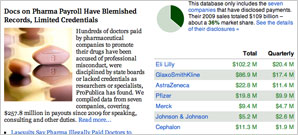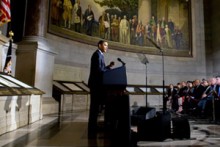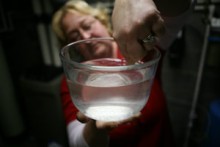Med Schools Flunk at Keeping Faculty Off Pharma Speaking Circuit

Stanford University's Hoover Tower / Getty Images file photo
As medical schools wrestle with how to keep drug companies from corrupting their faculties, Stanford University is often lauded for its tough stance.
The school was one of the first to stop sales representatives from roaming its halls in 2006 [1]. It cut off the flow of free lunches and trinkets emblazoned with drug names. And last year, in a blow to its physicians’ wallets, Stanford banned them from giving paid promotional talks for pharmaceutical companies.
One thing it didn’t do was make sure its faculty followed that rule.
A ProPublica investigation found that more than a dozen of the school’s doctors were paid speakers in apparent violation of its policy—two of them earning six figures since last year.
Dr. Philip Pizzo, the dean of Stanford’s medical school, sent an e-mail [2] to all medical school staff last week calling the conduct “unacceptable.” Some doctors’ excuses, he wrote, were “difficult if not impossible to reconcile with our policy.”
He was not the only school official caught off-guard.
Faculty at a half-dozen other institutions—including division chiefs—also lectured for drug firms in the last two years, ProPublica found, despite restrictions on such behavior. The University of Pennsylvania, the University of Pittsburgh and the University of Colorado Denver, among others, have launched reviews.
Conflict-of-interest policies have become increasingly important as academic medical centers worry that promotional talks undermine the credibility of not only the physicians giving them, but also of the institutions they represent.
Yet when it comes to enforcing the policies, universities have allowed permissive interpretations and relied on the honor system. ProPublica’s review shows that approach isn’t working: Many physicians are in apparent violation, and ignorance or confusion about the rules is widespread.
As a result, some faculty physicians stay on the industry lecture circuit, where they can net tens of thousands in additional income.
Critics of the practice say delivering talks for drug companies is incompatible with teaching future generations of physicians. That’s because drug firms typically pick the topic of the lecture, train the speakers and require them to use company-provided presentation slides.
“You’re giving someone else’s messages, someone else’s talk, someone else’s judgments,” said Dr. Bernard Lo, a medical professor at University of California, San Francisco who chaired a national panel [3] examining conflicts of interest in medicine. “We don’t allow our students to use someone else’s work.”
Reporters compared the names of faculty members at a dozen medical schools and teaching hospitals with ProPublica’s Dollars for Docs [4] database of payments publicly reported by seven drug companies. Lists of the physicians whose names matched were provided to the universities and hospitals for verification and comment.
Because the majority of the more than 70 drug companies in the United States don’t report such payments, the review provides only a glimpse of possible lapses at schools. As more companies make their speaker fees public, additional faculty will likely show up, several university officials said.
Those who study conflicts of interest in academia say the findings point to a significant problem for teaching hospitals. Schools should not only have a policy— many do not — they need to enforce it. Absent that, others will police their staffs for them using drug company payment websites.
“For God’s sake, if the media can look at these websites, why can’t we?” said David Rothman, president of the Institute on Medicine as a Profession at Columbia University. “Why trust if you can verify?”
Most universities were unwilling to confirm whether individual faculty members flagged by ProPublica had erred, making it difficult to tally all offenders.
At Stanford, officials said some faculty members provided proof that they had not violated the policy because they used their own lecture materials or stopped speaking as soon as it took effect.
But others conceded they were in the wrong.
Among them was Dr. Alan Yeung [5], vice chairman of Stanford’s department of medicine and chief of cardiovascular medicine who earned $53,000 [6] from Eli Lilly & Co. in 2009 and the first half of 2010. In an e-mail, Yeung said he quit speaking for the company this fall.
“I take full responsibility for this error,” he said. “Even though I felt that these activities are worthwhile educational endeavors, the perceived monetary conflict may be too great.”
Child psychiatrist Hans Steiner [7] was paid $109,000 [8] by Lilly to deliver talks about a drug for attention deficit hyperactivity disorder. In an e-mail, Steiner said he spoke in “very rural and other impoverished settings which only have limited access to experts like me.”
He said he wrongly assumed Stanford’s policy didn’t apply to him once he became an emeritus professor last year, but now, “I fully intend to comply.”
Pizzo, Stanford’s dean, said physicians who appear to have violated the policy will be investigated and referred for discipline if necessary. He compared some of their explanations to what a cop might hear after catching a motorist running a late-night stop sign.
“You can give 1,000 reasons: There was nobody around. It’s safe. I looked and didn’t harm anyone,” he said. “The reality is, it’s still a stop sign.”
Disclosures come as surprise
Dr. Richard Krugman, vice chancellor for health affairs at the University of Colorado Denver, thought his policy was working fine until his staff ran the medical school’s roster through ProPublica’s database. Some in his faculty showed up.
Krugman said he had made “the assumption that professionals have integrity and will live by the rules.” Now he’s trying to figure out what happened.
The 2008 policy [9] bans faculty from speaking on behalf of companies if “the content of the lectures, slides, references or educational handouts is subject to approval by industry representatives.” Any contracts with drug companies must be pre-approved by the university.
ProPublica identified 13 UC Denver physicians whom drug companies reported as paid speakers.
Dr. Michael McDermott [10], director of the endocrinology and diabetes practice at the University of Colorado Hospital, earned the most [11], nearly $117,000 from Lilly. While his talks involved a Lilly drug, McDermott said he only used the company’s slides in a fraction of them.
“From my standpoint, the value of my programs is purely educational for the attendees,” he wrote in an e-mail. Selling of the drug is left to company reps “to be done at a time that is different than when I give my talk.”
Still, he said, “I am weighing my future participation.”
A UC Denver spokesperson would not say whether McDermott had violated the school’s policy, citing personnel rules. After a review, the activities of some doctors flagged by ProPublica were cleared; others were not, she said.
UC Denver’s experience was mirrored at other schools where officials discovered their policies were not working as expected.
The University of Pittsburgh’s 2008 policy [12] clearly restricts paid speaking, said Dr. Barbara Barnes, an associate vice-chancellor in charge of industry relationships. Yet ProPublica found 22 Pitt doctors in its database.
Barnes said some were determined to be in compliance; others have terminated their drug company contracts or will do so. “Ultimately we rely on proper disclosure and good faith efforts by our physicians to monitor and enforce this policy,” she said in an e-mail.
The University of Pennsylvania health system’s 2006 policy [13] states that faculty “should not participate in industry marketing activities.” Penn’s chief medical officer, Dr. P.J. Brennan, said he interprets that to prohibit delivering drug company lectures.
“It flies in the face of what a professional ought to be,” he said.
ProPublica found 20 Penn speakers in its database. Five, including one who left Penn last month, made more than $40,000.
The top paid, according to Dollars for Docs, was Dr. Corey Langer, director of thoracic oncology at Penn’s Abramson Cancer Center. He received nearly $70,000 [14] speaking for Lilly since 2009.
Langer also received unknown amounts from other companies, including Genentech Inc., OSI Pharmaceuticals Inc., Bristol-Myers Squibb Co. and ImClone Systems, according to his disclosure [15] for a medical education program this month.
In an e-mail, Langer said he was “now fully aware” of Penn’s policy and is “taking measures to curtail speaking for pharmaceutical companies.”
Brennan said some paid speakers have told him they deliver the same lectures they have given at unpaid, academic forums. “I don’t know where the discrepancy lies,” he said. Either way, he said Penn “clearly” needs to make its policy more explicit.
A question of control
Several schools’ policies appear to have strong prohibitions against industry speaking but in practice may not.
The University of California, San Francisco began placing restrictions on speaking in 2007 [16] and expanded them this year [17]. The current policy prohibits participation “in any company speakers’ bureaus in which the sponsor determines the content of presentations or in any way controls or limits what may be presented by the speaker.”
The key word is “control” – a word that appears in policies across the country but is interpreted differently. At some schools this means that speakers need to prepare their own slides and speech — or not give the talk. But at UCSF and schools such as the University of Southern California, speakers can say they are in “control” if they agree with what the drug company has provided.
Drug companies say they insist that speakers use their materials to keep them from running afoul of U.S. Food and Drug Administration regulations.
Dr. David Jablons, UCSF’s chief of thoracic surgery, earned $94,000 delivering speeches for Lilly. In an e-mail, he said he uses Lilly’s slides to discuss its lung cancer drug but would “unquestionably refuse to give the talk” if he was asked to say something he didn’t believe.
In a series of e-mails, Dr. Neal Cohen, a vice dean of UCSF’s medical school, gave different interpretations of its policy.
Initially, Cohen wrote that Jablons complied with the intent of the policy because he “uses evidence-based scientific data with which he agrees.”
Asked how that squared with UCSF’s policy, Cohen replied: “The scientific credibility and lack of commercial focus of material presented is the critical issue, not who prepares the slides.”
Pressed about whether any faculty member could be out of compliance given such an interpretation, Cohen appeared to change his stance. He said he didn’t believe that UCSF faculty should be giving paid speeches in which the companies prepared or controlled the content via slides.
“We are educating our faculty about the policy and are taking active steps to re-examine the policy language to clarify it,” he said, as well as coming up with a better plan to enforce it.
Slow to enact rules
This debate over how to manage the influence of drug companies at teaching hospitals is evolving.
The Cleveland Clinic has rules [18] on conflict of interest in research and requires each faculty member to disclose medical industry ties on its website, but it does not restrict promotional talks.
The clinic does, however, employ one of the most ardent critics of the practice: Dr. Steven E. Nissen, its chairman of cardiovascular medicine, who calls industry-paid speakers “whores.”
At the same time, several of his colleagues made at least $25,000 speaking since 2009, including endocrinologist Adi Mehta, who pulled in more than $200,000 [19], according to Dollars for Docs.
Guy Chisolm, director of the clinic’s Innovation Management and Conflict of Interest Program, said he expects the clinic will adopt some rules governing speaking. But he said, “These things do not happen fast.”
It’s been nearly five years since a diverse group of experts proposed restricting the relationships between academic physicians and the industry, including a ban on drug company talks. While acknowledging the importance of industry collaborations in developing new drug therapies and medical devices, they worried about schools losing their ethical compass.
“The serious threat that this state of affairs poses for professionalism, and for the trust that patients have in physicians, makes the need for effective guidelines on industry-physician relationships both apparent and urgent,” they wrote in a 2006 article [20] in the Journal of the American Medical Association.
The trade group representing academic medical centers also advises against company-sponsored talks [21]. But the Association of American Medical Colleges doesn’t track which of its members follow its advice, said Ann Bonham, the group’s chief scientific officer.
“We have to trust that institutions are enforcing their guidelines or prohibitions,” she said.
Self-policing leaves door open
Some schools have made enforcement a matter of conscience.
Duke University is among those with policies [22] that “strongly discourage” speaking but leave it up to individual physicians to decide what’s right. Faculty members must report their speaking internally, but they are free to do it.
Duke had more than three dozen speakers in Dollars for Docs.
Dr. Ross McKinney, director of the school’s Trent Center for Bioethics, Humanities, and History of Medicine, said he’d like the policy to be strengthened because speaking can tarnish the reputations of faculty by suggesting their research or clinical practice is biased.
Although he lacks the official authority to stop it, he said the school is in the process of calling in every doctor who made more than $25,000 to stress that “their opinion will be less worthy of regard because of their relationship with industry.”
In response, he said, some physicians have said they wanted to make more money to pay their kids’ college bills, but they plan to scale back. Others said they just liked speaking or told him it wasn’t his business.
The University of Miami seems to be taking a middle ground. Although it allows faculty members to deliver paid talks in many circumstances, the money they earn is disclosed on a public website [23].
Still, more than a dozen University of Miami doctors did not properly report their earnings, ProPublica found and the school confirmed. In some cases, the payments listed on the school’s website were smaller than reported by drug companies in Dollars for Docs. One physician who Lilly paid nearly $17,000 had nothing listed on Miami’s website.
In other cases, a university official said, faculty members apparently attributed payments from a drug company to third parties, obscuring the actual source.
“Whether they’re purposely hiding information from us, I have no way of telling,” said Dr. Jorge Guerra, vice president for clinical affairs at the University of Miami medical school.
Guerra said the school is already correcting the omissions in the online disclosures and has referred some physicians for possible disciplinary action.
One school’s success
For UMass Memorial Health Care, checking the Dollars for Docs database came as confirmation that its faculty got the message.
The central Massachusetts training hospital found only one of its nearly 1,000 employed doctors had received a speaking fee—and that was for $188.
“Really the success was in educating the physicians … and getting them to buy into it,” said John Randolph, vice president and chief compliance officer, of the hospital’s 2008 speaking ban [24].
But Randolph said the success is not yet complete. The policy at UMass, as at many other institutions, covers only employed faculty, not community doctors who have privileges at their hospitals or physicians who serve as volunteer teachers.
Just this year, Stanford expanded its policy [25] to include community physicians after finding that some were making significant sums speaking for drug companies using their Stanford titles.
Randolph said he hopes to keep such physicians from trading on the UMass name. He can’t stop them from speaking, he said, but he doesn’t want them mentioning his school when they do.
“That’s our next step,” Randolph said. “We’ll get there.”
Dan Nguyen, news applications developer at ProPublica, contributed to this story.
Inform our investigations: Do you have information or expertise relevant to this story? Help us and journalists around the country by sharing your stories and experiences [26].
Get ProPublica's investigations and major stories delivered to your inbox [27].
- http://med.stanford.edu/coi/siip/policy.html
- http://deansnewsletter.stanford.edu/archive/12_13_10.html#4
- http://www.iom.edu/Activities/Workforce/ConflictOfInterest.aspx
- http://projects.propublica.org/docdollars/
- http://med.stanford.edu/profiles/Alan_Yeung/
- http://projects.propublica.org/docdollars/search?term=alan+yeung&state%5Bid%5D=
- http://med.stanford.edu/profiles/Hans_Steiner
- http://projects.propublica.org/docdollars/search?term=hans+steiner&state%5Bid%5D=
- http://www.ucdenver.edu/academics/colleges/dentalmedicine/Documents/PharmSchoolInteractions.pdf
- http://www.ucdenver.edu/academics/colleges/medicalschool/departments/medicine/EndocrinologyMetabolismDiabetes/faculty_staff/Pages/McDermott.aspx
- http://projects.propublica.org/docdollars/search?term=michael+mcdermott&state%5Bid%5D=
- http://www.coi.pitt.edu/IndustryRelationships/Policies/IndustryRelationshipsPolicy.pdf
- http://www.uphs.upenn.edu/cep/resources/PhARMA%202-202006%20prof-industry.pdf
- http://projects.propublica.org/docdollars/search?term=corey+langer&state%5Bid%5D=
- http://www.rockpointe.com/index.php/online/lungcases
- http://medschool2.ucsf.edu/files/som/downloads/pdf/guidelines-industry-interactions.pdf
- http://policies.ucsf.edu/150/15030.htm
- http://my.clevelandclinic.org/about/overview/integrity.aspx
- http://projects.propublica.org/docdollars/search?term=adi+mehta&state%5Bid%5D=36
- http://jama.ama-assn.org/content/295/4/429.abstract
- http://services.aamc.org/publications/showfile.cfm?file=version114.pdf&prd_id=232
- http://medschool.duke.edu/modules/som_interests/index.php?id=7
- http://med.miami.edu/about-miller/faculty-disclosures
- http://www.umassmemorial.org/workfiles/Med%20Center%20PDFs/1143%20Policy%20on%20Vendor%20Relationships.pdf
- http://med.stanford.edu/ism/2010/march/adjunct.html
- http://www.propublica.org/article/dialysis-inform-our-investigations
- http://org2.democracyinaction.org/o/6253/p/salsa/web/common/public/signup?signup_page_KEY=1884
A version of this story ran in the San Francisco Chronicle.
Related Story
- Drug Companies Retain Tight Control of Physicians’ Presentations - Drug companies keep strict control of materials doctors use in paid presentations about pharmaceuticals. The companies say this ensures that speakers comply with U.S. FDA regulations.
Tracking the Money
-
Our Dollars for Docs Database
We compiled tens of thousands of records from all the companies that have disclosed their payments to doctors so far. Search for your physician.
ProPublica compiled thousands of records to track the financial ties between doctors and drug companies.
Latest Stories in this Project
- Dollars for Docs Payments Approach $300 Million
- Drug Companies Retain Tight Control of Physicians’ Presentations
- In Minnesota, Drug Company Reports of Payments to Doctors Arrive Riddled With Mistakes
- Massachusetts Posts Pharma Payments to Health Providers
- Drug Firms Say They'll Take Closer Look at the Docs They Pay
Year End Giving
As the end of the year approaches, please consider making a donation to ProPublica. Your support will help us continue our critically important work of publishing investigative journalism in the public interest.
Get Updates
Our Hottest Stories
- White House Drafts Executive Order for Indefinite Detention
- For Brain-Injured Soldiers, Top Quality Care From a Philanthropist, not the Pentagon
- States Sue Bank of America: Bank Employees Dish, and Other Highlights
- Med Schools Flunk at Keeping Faculty Off Pharma Speaking Circuit
- Residents Divided About PA’s Agreement With Gas Drilling Company Over Water Contamination - ProPubli
- Pentagon Health Plan Won’t Cover Brain-Damage Therapy for Troops
- Drug Company Payments to Doctors | Dollars for Docs
- Drug Companies Retain Tight Control of Physicians’ Presentations
- Fannie and Freddie’s Regulator Opposes Reducing Mortgages for Struggling Homeowners
- Investigations








12 comments
Daniel Haszard
Dec. 20, 2 a.m.
Eli Lilly Zyprexa corporate greed
The use of powerful antipsychotic drugs has increased in children as young as three years old. Weight gain, increases in triglyceride levels and associated risks for diabetes and cardiovascular disease.
The average weight gain (adults) over the 12 week study period was the highest for Zyprexa—17 pounds. You’d be hard pressed to gain that kind of weight sport-eating your way through the holidays.
One in 145 adults died in clinical trials of those taking the antipsychotic drugs Zyprexa. This is Lilly’s # 1 product over $ 4 billion year sales,moreover Lilly also make billions on drugs that treat the diabetes often that has been caused by the zyprexa!
—-
Daniel Haszard Zyprexa victim activist and patient who got diabetes from it. http://www.zyprexa-victims.com
Dumb Struck
Dec. 20, 10:45 a.m.
I am struck by how the ProPublica’s Dollar for Docs web site is continuing to uncover issues surrounding physician behavior. This is what journalism is meant to do. Well done!
This article exposes what is happening at the best academic medical schools in the nation. Schools with policies and we are better then you attitude. As if…guess you need to heal yourself first.
This is not an epidemic but clearly it shows physicians are actively seeking dollars from pharma. (Can you hum the theme from Donald Trumps Apprentice?) I can’t imagine pharma reps coming in and putting a cloth bag over the heads of these best and brightest, dropping them in the trunk of a car, delivering them to a podium, and making them speak. These physicians wanted money; pharma had money. Love at first intubation. I can imagine these physicians will rat out pharma in a heat beat. Telling everyone they were duped boo hoo.
PK
Dec. 20, 2:07 p.m.
I’m a non-academic doc, and this is very one-sided journalism. First, academic docs make 1/2 to 1/3 as much as physicians in private practice. These are the best and brightest of medicine, getting paid less because they choose to become researchers and educators. I always felt guilty that I make more than my professors, who are smarter and more experienced than I am. It is like paying NFL football players less than minor league players. I understand everything isn’t about money, but within certain constraints it should be acceptable to do pharma talks that are unrestricted (e.g. self-written slides, rather than company-provided ones.)
Think about the alternatives: Only private practice docs will give talks (quality of talks goes down), and more academics will quit research (quality of medicine goes down).
Please, ProPublica… I understand negative journalism and sensationalism makes money, but please try to be a little more balanced.
Gina Pera
Dec. 20, 2:33 p.m.
I agree with PK, above.
Moreover, I am grievously disappointed with Pro Public going for not only the low-hanging fruit but also the much-overripe and picked-over fruit.
Granted, there have been abuses both by pharma and by mediocre docs who bolster their income with pharma talks. These have been examined to a faretheewell. What I was hoping, with Pro Publica, was a meatier discussion—not to mention smarter context.
As an award-winning journalist, I was shocked to learn 10 years ago that physicians and therapists were so ignorant on the subject of ADHD as it affects all age groups. This was when ADHD first touched my life and I learned of the rampant ignorance not only in the general public and the medical profession but especially in the media!
Where is the story on that?
Where is the investigative, hard-hitting piece on how reactionary most journalists are when it comes to reporting on psychiatric issues? How ready they are to pile up on big, bad old pharma? How eagerly they seek out the rogue researchers (the outliers who would have no career unless it was as self-designated pharma watchdog or anti-pharma crusader) to satisfy the reporters’ own cognitive dissonance?
Where is the story on the wide range of myopic bias and outright mental illness among psychiatrists? Those who still refuse to accept (perhaps because they cannot understand) the science underlying many psychiatric illnesses? Those who still maintain that it is their own little theories that will cure a patient and, when it doesn’t, declare the patient “treatment resistant”?
I read none of these, but I see it every day. Chuck Grassley, Scientology, and journalism makes for strange bedfellows indeed.
I attended the American Psychiatric Association conference in SF two years ago, and I was shocked to see not ONE presentation on ADHD, despite this highly studied and highly heritable condition affecting as much as 10 percent of the American public. And despite it being the most highly impairing outpatient condition. Only one talk—a clearly labeled “industry sponsored” talk—educated conferencegoers on the evidence-based treatment of ADHD.
THESE are the stories. And Pro Publica has just followed the mainstream media in copy-catting the easy, pandering headlines. How disappointing!
While the mainstream media has taken a mostly aggressive anti-psychiatry stance, I am pleased to see that the public is much smarter. And so are the 88+ PBS stations nationwide who this month have done more to educate the public about ADHD than a decade’s worth of newspapering—without the myth and obfuscation to go with it.
The response to the TotallyADD documentary program has been astounding, from real people who are suffering but never knew why. Because their doctors didn’t know (and if they didn’t know, were incompetent in dispensing medication). And the media plays a role in perpetuating their ignorance and fear of “Big Pharma.”
Pro Publica is more like Pro Reporter Bias. What a disappointment.
Gina Pera, author
Is It You, Me, or Adult A.D.D.?
Gina Pera
Dec. 20, 2:45 p.m.
Steve Nissen calling others physicians “whores” is pretty funny
There has never been a more grandstanding physician, campaigning for the FDA chief slot by creating massive hysteria about ADHD medications vis a vis cardiac events. The result: Physicians were spooked and so where parents of children with ADHD.
Nissen based his grandstanding on a flawed study and refused to be educated on ADHD treatment. (Perhaps refuse is too strong a word. I’ve learned how MD medical specialists really are not up to the study of scientific subjects that lay outside their proceduralist training.)
Ah, but he gave great quote, didn’t he? And Pro Publica lapped it up.
Harvey M. Solomon
Dec. 20, 5:49 p.m.
Every profession has its whores.They can be stratified starting with politicians and bankers and ending with touts and pimps. In medicine it appears that the faculties of a large number of even our most outstanding institutions worship at the altar of Mammon. No specialty is worse than psychiatry where even chairmen of departments suckle at the bosom of the pharmaceutical industry. So many articles written in the peer reviewed journals of psychiatry have been prepared by drug company hacks the the literature has become a treasure trove of lies and misinformation. The most telling example of the degeneration of psychiatry as a discipline is that some psychiatrists invent new imaginary diseases for which they prescribe medications which have no other meaningful use. It’s been a long time since I graduated from medical school. Then psychiatry was primarily a Freud based field and now it seems to be based on fraud.
Gina Pera
Dec. 20, 6:08 p.m.
1. With all due respect, Harvey, it’s time to update your knowledge base, assuming that you learned anything about the brain 40+ years ago. News flash: The brain is an organ. A very delicate, vulnerable organ in which many things can go wrong, from conception forward.
2. I note with some irony and no small amount of humor your apparent place of employment: The Hoffman-La Roche Special Treatment Unit.
Harvey M. Solomon
Dec. 20, 7:10 p.m.
Gina
You’re a little out of date. I was a clinical pharmacologist in the 1960s working for a really big whore pharmaceutical company. I learned very quickly that the pharmaceutical industry was not interested in anything except the bottom line. I’ve followed their banditry with interest ever since. I retrained as a pathologist and and my last position was as Director of Laboratories for Quintiles Ltd. (horror,horror,horror) .
Thanks for the input about the brain. I’ve held lots of them in my hands, some still warm, and there was a lot wrong with them.
Samuel Scott
Yesterday, 2:53 a.m.
Pharmaceuticals companies care about one thing and one thing only: making money. The only problem with the pharmaceutical business is that their products can really hurt you, if not kill you. When a pharma company finds out its product is doing more harm then good(think avandia), they do not remove it from the market, they try to cover up the data and attack those who point this out. No one should be surprised at the lengths pharma will go to make money and no one should think that doctors are angels. Just look up antipsychotics on wikipedia, the cost benefit seems pretty bad yet their marketed really aggressively. All in all we must remember that big pharma is a public business with its only concern being the bottom line.
John Niemeyer
Yesterday, 11:59 a.m.
So a pretty blond with nice teeth and a tight sweater is a better way for drug and device manufacturers to get their message out to the masses of overworked physicians struggling to stay up to date with the latest developements in medicine? I for one relish the opportunity to hear a nationally recognized expert in my field when he is made available to me for free in my home town. I can listen to his talk knowing full well that he is beig paid by the sponsoring company with a critical ear. I can then ask him questions, consider his answers and reinforce my ultimate opinion with my own review of the relevant literature as well as discussing the lecture content with other colleagues in attendance.
In my experience, most of these physicians are dedicated, intelligent caring physicians who really have something to offer to the medical community. I have no problem with them being compensated fairly for their time and expertise. They are a bargain compared to similar talent in the legal or financial sectors.
It costs me thousands of dollars and days away from my practice to get exposure to similar talent at the national meetings I attend regularly. I welcome these complementary educational activities which cost me only an evening away from my family.
Doc University
Yesterday, 6:21 p.m.
Last night the Goodyear rep took out the salesperson at Discount tires who sold me their tires today. This is a safety issue - right? There isn’t a field or a person that is not exposed to these corporate issues. EVERY doctor accepts money - advertisements appear in the journals, companies display at meetings and these lower the costs of either item.
The issue is judgment and ethics. MD’s, while not perfect show a higher level of ethics than any other group. Expert witnesses and actuarials are PAID to give their information in court by the side that hires them. Conflict? Lobbyists are hired to give talks to legislators specifically so the lawmaker can hear what they have to say and then DECIDE what to do. Conflict?
Should an MD disclose how much they get paid each time they suggest a surgical procedure or is there an inherent trust here? Should a restaurant waiter or store salesperson disclose what they make and what the store makes on each product? How do you trust their recommendations? How much was the writer paid for this article? How much does ProPublica get in donations or grants because of this writing? Do they count web hits?
I have never seen an MD write a prescription that hurt a patient because a rep or lecturer told them to. MD’s get their information from multiple sources and measure what they hear and then DECIDE.
Who do you want Pharma going to? The best and brightest. Done right these talks and fees enhance knowledge and care.
This is all much ado about nothing.
Francis
Today, 9:02 a.m.
In spite of the odious facts about the manner in which healthcare (sickness care and profiteering) has been abused, there seem to be many who seek excuses for those in so called academia. They are not suffering financially and whilst it is unreasonable to tag them all with the same broad brush of greed and iniquity, there is a preponderance of these traits there too. There have been shills for ineffective and dangerous drugs; guys whom have painted research rodents to misrepresent inherited traits and some who have published Pharma written articles falsely presented as their original research. All of this for a big fee….and absoluttely no care for the unsuspecting patient.
Any reputable newspaper will reveal lincidents of a component of health care (providers, hospitals, drug and equipment manufacturers) being excoriated legally or paying a settlement to avoid being exposed to a non enquiring public. The medical profession has one of the biggest lobbies in Washington ( at one time they were #2 after real estate). It is a racist profession (unlike others they have acknowledged and apologized for this, recently).
There is avarice and greed that is taught (by example) in many of these schools. The ivory towers that are predominantly based in inner cities provide training fodder (poor, uninsured and underinsured patients) for medical students and physicians. This so called care is mostly at the end of life or near to it; after a lifelong denial of effective primary and preventive care available to about 50% of the US population.
Pharmaceutical and equipment companies are the gasoline, oil and hardware that enable this wanton waste of human capital. The medical profession is a willing participant as we manufacture pure sounding motives for undisguised greed. It is wrong and, as we have read in leading publications recently, attempts by some allegedly leading schools to get their medical leadership to cease taking pharmaceutical fees (bribes) have been less than successful. Really? Are these the same people whom we are supposed to trust with our lives in the ICU and OR. Are those taking care of us doing so with the same attentiveness and skill as they would use for the Bigup family from the rich and not so wealthy white suburbs? Are trainee surgeons and others supervised so that we all get similar opportunities at recovery.
If you cannot ensure ethical behavior among your professors and lecturers and then seem unable to discipline truancy, how and why should we trust you with our care? Slavery, sexism, homophobia and racism were not lessened and abolished by the inaction of cowards or by publications of the WCC (white citizens council). The misdeeds in the sickness care business can be compared to some of the horrible practices in so called finance (banks etc), mortgage and so called religious bodies who effectively use their titles as fronts for inhumane activities. Thank you Propublica!